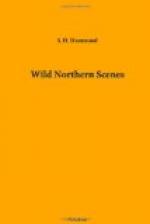efforts of science. You must create a radical
reform in every department of life; in business, in
social habits, in the fashions, in the mode of living,
in everything, before you can hope to reach the Utopia
of which you speak. The outrages perpetrated
upon nature by the conventionalities of the world
alone, would be an insurmountable barrier to the realization
of your idea. The necessity for excessive labor
to satisfy artificial wants hews away at one end of
society, and the indulgence of idleness and ease,
at the other. Exposure to the elements, to heat
and cold, buries its millions; and too great seclusion,
in pursuit of comfort in heated rooms, and a confined
and corrupted atmosphere, buries its millions also.
Lack of wholesome food fills thousands of graves,
and the results of abundance fill other thousands.
Lack of appropriate clothing, fitted for the constitution
and the seasons, engenders disease and death; and
an excess of the same article, fashioned as stupendous
folly only can fashion it, engenders vastly more disease
and death. There are elements of decay and death
furnished to men and women, tempting their weakness,
and forced upon their adoption by the conventionalities
of life, every day, every hour, and everywhere.
It is a part of our civilization, an offshoot of the
very progress of which you speak, a sort of necessity
in practical results, at least, that men
shall
so live as to wage war against nature, and against
themselves; that they shall hurry themselves, or be
hurried by inevitable circumstances, into the grave
at the earliest possible moment. You may, therefore,
dismiss from your mind, my friend, the fanciful idea,
that science will ever enable the world to dispense
with the cemeteries, or that the cities of the dead
will, through its agency, cease to flourish.
You will find that as science closes up one avenue
to the grave, men will force a way to it through another.
We shall have to live as our fathers lived, be subject
to disease as they were, grow old as they grew old,
and die as they died. We must submit to the law
which has written the doom of decay upon all things,
which has made us mortal, and when our time comes we
must be content to pass away as the countless millions
who preceded us have done.”
“Well,” said Spalding, as he knocked the
ashes from his pipe, and rose to retire, under the
cover of the tent, for the night, “be it as you
say, what matters it? ‘I would not live
always.’ Give to us the hope of an hereafter,
a faith that looks through the valley of the shadow
of death, and sees immortality, a world of glory beyond,
and what matters it how soon the hour of our departure
shall come?”
CHAPTER XXIX.
A MYSTERIOUS SOUND—TREED BY A MOOSE—ANGLING FOR A POWDER HORN—AN
UNHEEDED WARNING AND THE CONSEQUENCES.
As Spalding ceased speaking, there came from away
off, over the forest in the direction of the tall
mountain peaks, a faint sound like the boom of a cannon,
so distant that it could scarcely be heard, and yet
it was distinct and palpable to the senses. I
say that it came from the direction of the mountains,
seen dim and shadowy in the distance, and yet none
of us were quite sure of this. We all heard it,
but not one of us could assert that the direction
from which it came was a fixed fact in his mind.




